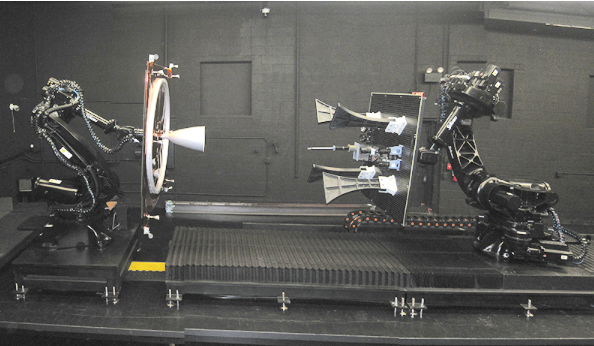
The Orbital ATK Rendezvous, Proximity Operations and Docking (RPOD) Lab uses full scale mock-ups of client vehicle and Mission Extension Vehicles to test RPOD sensors, actuators, control algorithms and contact dynamics of our satellite servicing vehicles.
Orbital ATK has conquered the ability to extend a satellite's life, and now has a customer that will take advantage of that talent with an in-orbit satellite servicing system with the Mission Extension Vehicle-1 (MEV-1) planned for launch in 2018.
In less than a year after announcing its first customer contract, Orbital ATK has made progress in developing its new satellite life extension service, a first in the industry, gives satellite operators the capability to extend the life of a healthy satellite.
Orbital ATK remains on track to introduce its in-orbit satellite servicing system with the Mission Extension Vehicle-1 (MEV-1). The vehicle is currently under production at the company’s satellite manufacturing facility in Dulles, Virginia. Scheduled to launch in 2018, the MEV-1 will begin its mission extension service for Intelsat, S.A., one of the world’s leading commercial satellite providers. Under terms of the five-year contract, the MEV-1 will provide life extension services to an Intelsat satellite with the option to service multiple satellites using the same MEV vehicle.
Controlled by the company’s satellite operations team, the MEV-1 uses a docking system that attaches to existing features on a customer’s satellite. It provides docked life extension services by taking over the propulsion and attitude control functions. Other capabilities include inspection and external imagery assessment, relocation of customer satellites to different orbital slots or to different orbits, and inclination pull-down services. Based on the company’s GEOStar spacecraft bus platform, the vehicle has a 15-year design life with the ability to perform numerous dockings and undockings during its life span.
The MEV-1 path to launch in 2018 includes several mission milestones already achieved:
- Established Space Logistics LLC, a wholly owned subsidiary of Orbital ATK to manage life extension services
- Substantial internal R&D and capital investments by Orbital ATK to support future in-orbit capabilities
- Contracted with Intelsat as our first life extension customer
- Established the MEV program office in Orbital ATK’s Advanced Programs Division with more than 80 engineers and support staff to design and build the MEV
- Completed various program reviews for the MEV-1 mission that included the Systems Requirements Review, the Preliminary Design Review and established required subcontracts including orders for all long lead equipment and supplies.
- Secured contract to launch MEV-1 aboard an International Launch Services (ILS) Proton launch vehicle in 2018. MEV-1 will fly as a co-passenger with the Eutelsat 5WB satellite. The Eutelsat 5WB satellite is a GEOStar 2 satellite already being built by Orbital ATK.
- Relocated the Rendezvous, Proximity Operations and Docking (RPOD) development laboratory to Orbital ATK’s satellite manufacturing facility in Dulles. The lab, first established at the company’s Beltsville, Maryland, facility, assists in developing and testing the RPOD sensors, actuators and control algorithms for the satellite life extension service.
“All of these activities and progress on MEV-1 align with our schedule for launch in 2018,” said Tom Wilson, President of Space Logistics, LLC. “Our game-changing technology will redefine the operational lifespan for satellites and provide maximum value to our customers. The MEV-1 mission is just the first step toward executing our roadmap to introduce even more advanced space logistics capabilities and services for commercial and government customers in the future.”
As development continues on the MEV-1 including an upcoming System Critical Design Review and the beginning of satellite subsystem integration and testing, work is underway on space logistics technologies for the future. Our roadmap targets robotics and high power solar electric propulsion capabilities, inspection and repair of ageing satellites as well as developing in-orbit robotic assembly technologies that can assist in building large space structures such as Mars transport vehicles. These innovations support Orbital ATK’s vision to establish a fleet of servicing vehicles that address the diverse needs of GEO satellites and provide customers with access to new markets and new opportunities.

